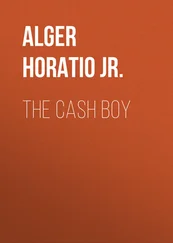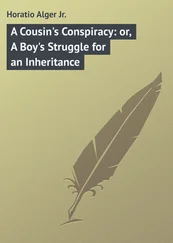Horatio Alger - The Telegraph Boy
Здесь есть возможность читать онлайн «Horatio Alger - The Telegraph Boy» — ознакомительный отрывок электронной книги совершенно бесплатно, а после прочтения отрывка купить полную версию. В некоторых случаях можно слушать аудио, скачать через торрент в формате fb2 и присутствует краткое содержание. Жанр: foreign_children, literature_19, foreign_antique, foreign_prose, на английском языке. Описание произведения, (предисловие) а так же отзывы посетителей доступны на портале библиотеки ЛибКат.
- Название:The Telegraph Boy
- Автор:
- Жанр:
- Год:неизвестен
- ISBN:нет данных
- Рейтинг книги:3 / 5. Голосов: 1
-
Избранное:Добавить в избранное
- Отзывы:
-
Ваша оценка:
- 60
- 1
- 2
- 3
- 4
- 5
The Telegraph Boy: краткое содержание, описание и аннотация
Предлагаем к чтению аннотацию, описание, краткое содержание или предисловие (зависит от того, что написал сам автор книги «The Telegraph Boy»). Если вы не нашли необходимую информацию о книге — напишите в комментариях, мы постараемся отыскать её.
The Telegraph Boy — читать онлайн ознакомительный отрывок
Ниже представлен текст книги, разбитый по страницам. Система сохранения места последней прочитанной страницы, позволяет с удобством читать онлайн бесплатно книгу «The Telegraph Boy», без необходимости каждый раз заново искать на чём Вы остановились. Поставьте закладку, и сможете в любой момент перейти на страницу, на которой закончили чтение.
Интервал:
Закладка:
"I am not used to be talked to in that way," said Frank, independently.
"You've always had your own way, I suppose," snarled Mills.
"No, I haven't; but I have been treated kindly."
"You are only a boy, and I won't allow you to talk back to me. Do you hear?"
"Yes."
"Then take care to remember."
"You've got a sweet disposition," thought Frank. "I won't stay with you any longer than I am obliged to."
Several days passed without bringing any incidents worth recording. Frank took a daily walk with the blind man, sometimes in the morning, sometimes in the afternoon. These walks were very distasteful to him. The companion of a beggar, he felt as if he himself were begging. He liked better the time he spent in selling papers, though he reaped no benefit himself. In fact, his wages were poor enough. Thus far his fare had consisted of dry bread with an occasional bun. He was a healthy, vigorous boy, and he felt the need of meat, or some other hearty food, and ventured to intimate as much to his employer.
"So you want meat, do you?" snarled Mills.
"Yes, sir; I haven't tasted any for a week."
"Perhaps you'd like to take your meals at Delmonico's?" sneered the blind man.
Frank was so new to the city that this well-known name did not convey any special idea to him, and he answered "Yes."
"That's what I thought!" exclaimed Mills, angrily. "You want to eat me out of house and home."
"No, I don't; I only want enough food to keep up my strength."
"Well, you are getting it. I give you all I can afford."
Frank was inclined to doubt this. He estimated that what he ate did not cost his employer over six or eight cents a day, and he generally earned for him twenty to thirty cents on the sale of papers, besides helping him to collect about a dollar daily from those who pitied his blindness.
He mentioned his grievance to his friend, Dick Rafferty.
"I'll tell you what to do," said Dick.
"I wish you would."
"Keep some of the money you make by selling papers, and buy a square meal at an eatin' house."
"I don't like to do that; it wouldn't be honest."
"Why wouldn't it?"
"I am carrying on the business for Mr. Mills. He supplies the capital."
"Then you'd better carry it on for yourself."
"I wish I could."
"Why don't you?"
"I haven't any money."
"Has he paid you any wages?"
"No."
"Then make him."
Frank thought this a good suggestion. He had been with Mills a week, and it seemed fair enough that he should receive some pay besides a wretched bed and a little dry bread. Accordingly, returning to the room, he broached the subject.
"What do you want wages for?" demanded Mills, displeased.
"I think I earn them," said Frank, boldly.
"You get board and lodging. You are better off than a good many boys."
"I shall want some clothes, some time," said Frank.
"Perhaps you'd like to have me pay you a dollar a day," said Mills.
"I know you can't afford to pay me that. I will be satisfied if you will pay me ten cents a day," replied Frank.
Frank reflected that, though this was a very small sum, in ten days it would give him a dollar, and then he would feel justified in setting up a business on his own account, as a newsboy. He anxiously awaited an answer.
"I will think of it," said the blind man evasively, and Frank did not venture to say more.
The next day, when Mills, led by Frank, was on his round, the two entered a cigar-store. Frank was much surprised when the cigar-vender handed him a fifty-cent currency note. He thought there was some mistake.
"Thank you, sir," he said; "but did you mean to give me fifty cents?"
"Yes," said the cigar-vender, laughing; "but I wouldn't have done it, if it had been good."
"Isn't it good?"
"No, it's a counterfeit, and a pretty bad one. I might pass it, but it would cost me too much time and trouble."
Frank was confounded. He mechanically handed the money to Mills, but did not again thank the giver. When they returned to the tenement-house, Mills requested Frank to go to the baker's for a loaf of bread.
"Yes, sir."
"Here is the money."
"But that is the counterfeit note," said Frank, scrutinizing the bill given him.
"What if it is?" demanded Mills, sharply.
"It won't pass."
"Yes, it will, if you are sharp."
"Do you want me to pass counterfeit money, Mr. Mills?"
"Yes, I do; I took it, and I mean to get rid of it."
"But you didn't give anything for it."
"That's neither here nor there. Take it, and offer it to the baker. If he won't take it, go to another baker with it."
"I would rather not do it," said Frank, firmly.
"Rather not!" exclaimed Mills, angrily. "Do you pretend to dictate to me?"
"No, I don't, but I don't mean to pass any counterfeit money for you or any other man," said Frank, with spirit.
Mills half rose, with a threatening gesture, but thought better of it.
"You're a fool," said he. "I suppose you are afraid of being arrested; but you have only to say that I gave it to you, and that I am blind, and couldn't tell it from good money."
"But you know that it is bad money, Mr. Mills."
"What if I do? No one can prove it. Take the money, and come back as quick as you can."
"You must excuse me," said Frank, quietly, but firmly.
"Do you refuse to do as I bid you?" demanded Mills, furiously.
"I refuse to pass counterfeit money."
"Then, by Heaven, I'll flog you!"
Mills rose and advanced directly towards Frank, with his eyes wide open. Fortunately our hero was near the door, and, quickly opening it, darted from the room, pursued by Mills, his face flaming with wrath. It flashed upon Frank that no blind man could have done this. He decided that the man was a humbug, and could see a little, at all events. His blindness was no doubt assumed to enable him to appeal more effectively to the sympathizing public. This revelation disgusted Frank. He could not respect a man who lived by fraud. Counterfeit or no counterfeit, he decided to withdraw at once and forever from the service of Mr. Mills.
His employer gave up the pursuit before he reached the street. Frank found himself on the sidewalk, free and emancipated, no richer than when he entered the service of the blind man, except in experience.
"I haven't got a cent," he said to himself, "but I'll get along somehow."
CHAPTER VI.
FRANK GETS A JOB
Though Frank was penniless he was not cast down. He was tolerably familiar with the lower part of the city, and had greater reliance on himself than he had a week ago. If he had only had capital to the extent of fifty cents he would have felt quite at ease, for this would have set him up as a newsboy.
"I wonder if I could borrow fifty cents of Dick Rafferty," considered Frank. "I'll try, at any rate."
He ran across Dick in City-Hall Park. That young gentleman was engaged in pitching pennies with a brother professional.
"I say, Dick, I want to speak to you a minute," said Frank.
"All right! Go ahead!"
"I've lost my place."
Dick whistled.
"Got sacked, have you?" he asked.
"Yes; but I might have stayed."
"Why didn't you?"
"Mills wanted me to pass a counterfeit note, and I wouldn't."
"Was it a bad-looking one?"
"Yes."
"Then you're right. You might have got nabbed."
"That wasn't the reason I refused. If I had been sure there'd have been no trouble I wouldn't have done it."
"Why not?" asked Dick, who did not understand our hero's scruples.
"Because it's wrong."
Dick shrugged his shoulders.
"I guess you belong to the church," he said.
"No, I don't; what makes you think so?"
"Oh, 'cause you're so mighty particular. I wouldn't mind passing it if I was sure I wouldn't be cotched."
Читать дальшеИнтервал:
Закладка:
Похожие книги на «The Telegraph Boy»
Представляем Вашему вниманию похожие книги на «The Telegraph Boy» списком для выбора. Мы отобрали схожую по названию и смыслу литературу в надежде предоставить читателям больше вариантов отыскать новые, интересные, ещё непрочитанные произведения.
Обсуждение, отзывы о книге «The Telegraph Boy» и просто собственные мнения читателей. Оставьте ваши комментарии, напишите, что Вы думаете о произведении, его смысле или главных героях. Укажите что конкретно понравилось, а что нет, и почему Вы так считаете.












